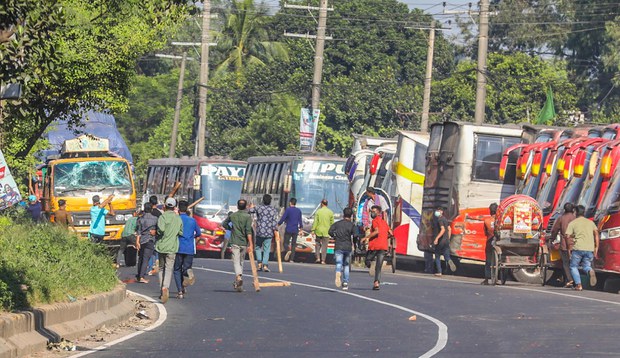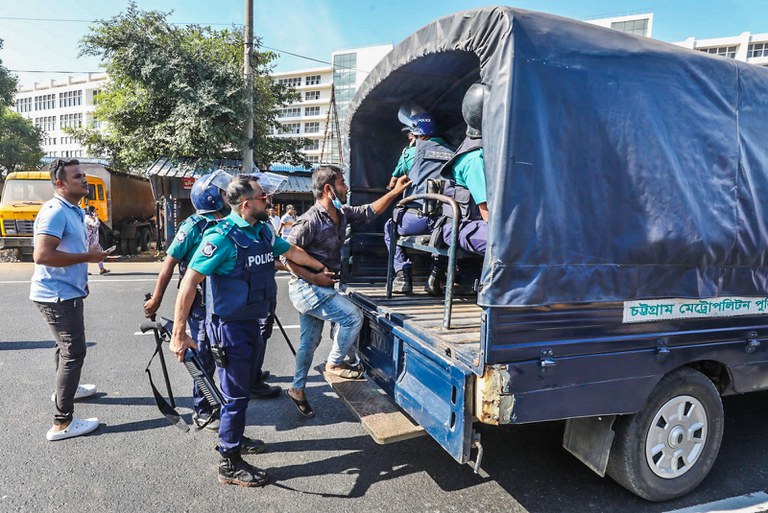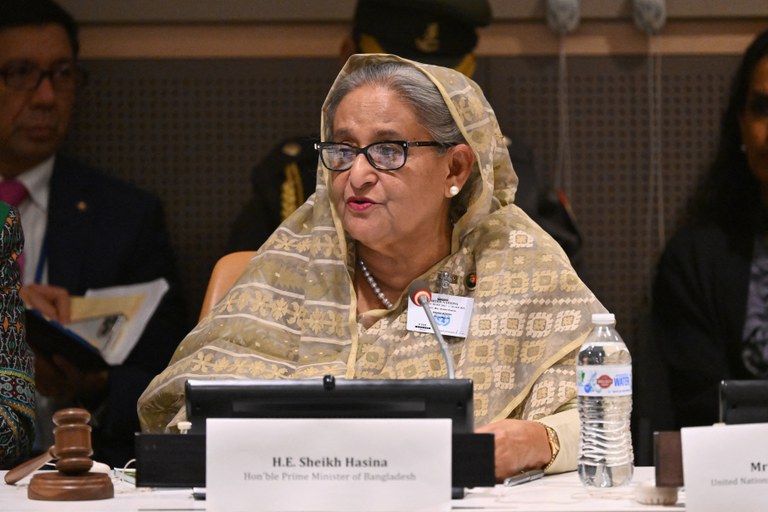More deaths reported in Bangladesh polls violence as BNP launches transport blockade
2023.10.31
Dhaka
 Activists armed with sticks vandalize a vehicle on the Dhaka-Chittagong Highway on the first day of the Bangladesh Nationalist Party’s three-day transportation blockade, Oct. 31, 2023.
Activists armed with sticks vandalize a vehicle on the Dhaka-Chittagong Highway on the first day of the Bangladesh Nationalist Party’s three-day transportation blockade, Oct. 31, 2023.
At least three activists died and hundreds more were injured Tuesday in clashes between police and demonstrators as Bangladesh’s main opposition party launched a transportation blockade in major cities, raising the death toll to 10 from poll-related protests that started Saturday.
Elsewhere, the U.S. ambassador urged all Bangladeshi political parties to engage in dialogue without preconditions to de-escalate the violence. But Prime Minister Sheikh Hasina dismissed calls for talks with the opposition Bangladesh Nationalist Party in the weeks leading up to a general election expected in January.
Bangladesh Jamaat-e-Islami and other opposition parties joined BNP in launching the three-day blockade to protest violence that took place on Saturday, when the two big opposition parties and the ruling Awami League held dueling rallies in Dhaka. The opposition parties are calling on Hasina and the Awami League to step down and appoint a neutral caretaker government ahead of the election.
Ruhul Kabir Rizvi, a senior BNP official, told reporters that two party activists were shot and killed in Kishoreganj and one was killed in a vehicle accident in Sylhet. He blamed police for all three deaths.
The officer-in-charge at the Kuliarchar police station in Kishoreganj said a police officer fired shots after he had been attacked and injured.
“As far as I know, two people have died in this incident. But I can’t say for sure whether they died due to shooting or some other reason,” Golam Mostafa told BenarNews.
In Sylhet, Azbahar Ali Sheikh, the deputy police commissioner, told reporters that police chased activists during the blockade.
“Two people were injured when a motorcycle struck a tree. Later the locals rescued them and admitted them to the hospital. One of them later died,” he said.
At least 20 people including three police officers were injured in a clash in Narayanganj, authorities said.
Hasina has been in power since 2009. Lately, the U.S. and other Western countries have amped up calls to demand that free and fair elections be held in the South Asian country, amid allegations from the opposition that previous polls were tampered with or rigged.

The latest deaths brought the overall toll to 10 since Saturday, according to police and party leaders. In addition, nearly 6,700 people, mostly BNP members, have been arrested. Police arrested BNP standing committee member Mirza Abbas near his Dhaka residence on Tuesday night.
On Tuesday, BNP and Awami League officials both played down allegations of violence by their activists taking part in the blockade.
“From the beginning, our workers have been carrying out the program peacefully. In some places, they grabbed sticks when the police and Awami League activists tried to challenge them,” BNP leader Rizvi told BenarNews.
Awami League presidium member Abdur Rahman responded that his party’s activists were trying to keep people and property safe.
“They were not doing any violence but were working to prevent violence,” Rahman told BenarNews.
Ambassador speaks out
Peter Haas, the American envoy here, called on all political parties to offer dialogue without any preconditions to end the violence – a call which Hasina rejected.
“Any action that undermines the democratic elections process – including violence, preventing people from exercising their right to peaceful assembly and internet access – calls into question the ability to conduct free and fair elections,” Haas said after meeting with Kazi Habibul Awal, Bangladesh’s chief election commissioner.
“All sides can engage in dialogue without preconditions in order to deescalate prevailing tensions and find a pathway to free, fair and peaceful elections.”
When a reporter asked Hasina during a news conference at her official residence about Haas’s comment, the prime minister questioned the need for such action.
“Dialogue with whom, who is the opposition party? In parliamentary style, the opposition party in the parliament is the real opposition party. Outsiders don’t count as parties, not even in America,” Hasina said.
She apparently was referring to how BNP has no lawmakers in Parliament. Seven BNP politicians were elected in the 2018 polls but have since resigned, leaving BNP unrepresented in the legislature.
Hasina asked why her administration should hold a dialogue with a group whose members fatally beat a police officer on duty during the rally. On Saturday, authorities identified the dead officer as Constable Aminul Parvez.
“The people of Bangladesh do not want dialogue with those murderers. Rather, the people of Bangladesh hate them,” Hasina said.

After his meeting with Haas, Awal, the chief election commissioner, said voters would go to the polls as required.
“We have made it very clear that the election commission has no option; the election commission has to conduct elections at the prescribed time according to the constitutional obligation, the prescription,” he told reporters.
Global reaction
Meanwhile, the United Nations issued a statement on Tuesday urging an end to polls-related violence in Bangladesh.
“We are deeply concerned by a series of violent incidents during ongoing protests in Bangladesh. As the country heads towards elections, we call on all political actors to make clear that such violence is unacceptable and to avoid any statements or actions that could constitute incitement to violence,” it said.
“In responding to the protests, police have reportedly attacked protesters with rods, batons, rubber bullets and sound grenades. They have also raided the homes of opposition activists across the country, indiscriminately arresting and detaining hundreds, including the activists’ family members, the Office of the High Commissioner for Human Rights said.
“We urge the police to ensure that force is only used when strictly necessary and, if so, in full compliance with the principles of legality, precaution and proportionality.”
Yasasmin Kaviratne, Amnesty International’s regional campaigner for South Asia, issued a similar statement.
“The Bangladeshi authorities need to remember that it is not a crime to dissent and they must respect everyone’s right to protest peacefully,” she said.
Home Minister Asaduzzaman Khan Kamal responded, saying that police had shown patience in dealing with BNP activists.
“Those we arrested have committed offenses. It is normal to be arrested if you commit a crime. No matter what the U.N. says, those who commit offenses must be arrested and face trial,” he told BenarNews.







